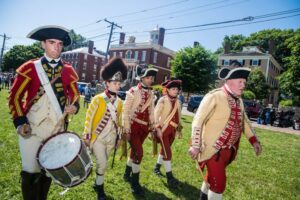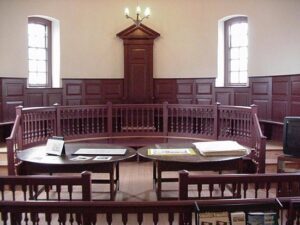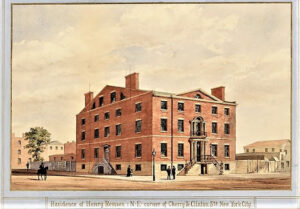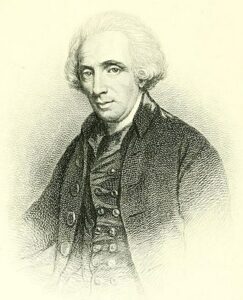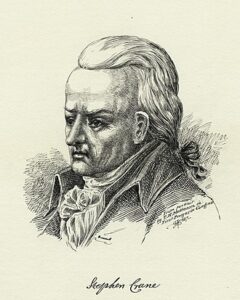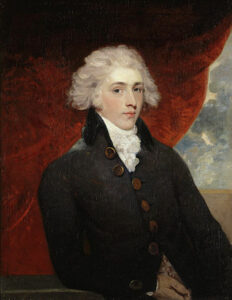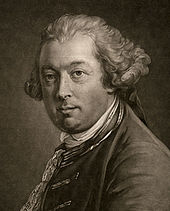Americanism Redux
July 25, your today, on the journey to the American Founding, 250 years ago, in 1774
Two little words, “if” and “only”.
Put them together and you make a razor’s edge, capable of slicing and cutting to the level of bone.
If only.
It’s today, 250 years ago, and the shining blade of the two words gleams in the light.
Welcome to Americanism Redux.
* * * * * * *
(part of the farm)
If only…you could see me here, where I am, right now.
That’s the plea of John Adams. He wishes one of his best friends could see him now, today, on his farm in Braintree, colony of Massachusetts. He loves the farm and all its work. More than anything. He loves the time and space where no politics, no clients, no tyrants are ever to be found. If only his friends could see Adams here, on the farm.
And yet in the same instant, amid the haystacks, the livestock, the tools, Adams thinks about knowledge he lacks—he doesn’t know enough about German, French, or Spanish royal courts to be able to predict the “revolutions” that might be unleashed by the recent death of Louis XV, King of France.
And he also thinks—dreams, is more like it—about the upcoming “congress” in Philadelphia and how a Cicero, a Ximenes, or a Demosthenes might conduct himself there. They’re what we need but instead, Adams tells himself, we’re getting people like me as the congress’s delegates.
If only…I was more prepared.
* * * * * * *
(the re-enacted Gage)
If only…they do themselves what they tell others to do.
British General Thomas Gage is in Salem, colony of Massachusetts, seated as the new headquarters of the British imperial government in the colony. The Boston Port Act shut down the existing capital, Boston, and forced the move to Salem. Four days ago Gage had tried something clever as the colony’s new governor—he adapted a technique of his fierce critics, those colonial rights supporters, for his own purposes as imperial governor.
He issued a public proclamation on July 21st “for the encouragement of Piety and Virtue, and for preventing and punishing of Vice, Profanity, and Immorality.” In a colony where religious and spiritual ways run deep, Gage wrote the proclamation to reduce resistance and opposition to British imperial law, which left unchecked, he implied, violates religious and spiritual teachings. The road back to proper spiritual living is the obedience to the proclamation.
Four days have gone by. Gage sees no signs—none—that his proclamation is serving any purpose other than fish wrap.
If only…they would listen to me, Gage sighs.
* * * * * * *
(open or closed?)
If only…a little guidance could be provided.
Today, confusion and uncertainty darken the minds of people on the Berkshire Committee of Correspondence, including John Paterson, committee member and newcomer to the Berkshires region. They’re in the western portion of the colony of Massachusetts and are struggling with important practical problems caused by the Coercive Acts and Gage’s implementation of them (besides the Boston Port Act, the Administration of Justice Act, the Administration Act, and the Quartering Act).
The county’s court is scheduled to begin hearing cases and conducting legal business in a few weeks. Paterson and others on the Committee of Correspondence don’t know whether the court should open or not. If it opens, it’s a signal that life is running as usual and the Coercive Acts are nothing out of the ordinary. But if the Coercive Acts are what Paterson and others say they are, which is to say tyrannical and oppressive and enslaving, then no court should function.
But what happens to daily life if justice, law, and the court that embodies both is closed?
The upshot of the practical turmoil is that the Berkshire Committee of Correspondence decides to draft a letter to the Boston Committee of Correspondence and seeks its advice, input, and guidance. Or as a later parlance might phrase it: “what now, dog?”
If only…they answer their mail.
* * * * * * *
(the home of the 51’s Hendrick Remsen)
If only…the hummingbirds will stand still.
That’s the equivalent improbability in New York City, colony of New York, today, 250 years ago. With regard to the new British imperial laws to punish Massachusetts, no one can find common agreement among New York City’s residents, nor among the people of its surrounding towns and villages. The split in opinion on next actions and next steps runs a dozen different ways at a dozen different angles. Yes, convene a congress in Philadelphia. Agreed. Yes, let’s send delegates. Agreed. Beyond that, no further agreement, only the fluttering of countless wings.
Peter Van Brugh Livingston is a wealthy merchant descended from a long-standing Dutch family. Today he convenes a meeting of “the committee of fifteen” to plan for the upcoming weeks. Members of the “fifteen” know the Livingstons and each other well; Peter is a member, too. Nevertheless, the meeting broke up when “nothing decisive was resolved upon.” Almost simultaneously on this day Hendrick Remsen, another Dutch-descended businessman whose trade network stretches to Europe and the West Indies, sits at the front of the “committee of fifty-one”. The “fifty-one” assembles and adopts a broad-based plan for everyone “who pays taxes” to elect five delegates for the upcoming congress. Their goal is to produce an election that is fair, secure, and trusted regardless of the multi-numbered “committees” scattered across New York trying to affect events.
If only…the fragmentation would cease and the coming-together would begin.
* * * * * * *
(he’s hoping the rumor is true)
If only…the plan is finished.
William Smith is part of the tangle of committees, members, and meetings in New York City. The 46-year old judge agrees that British imperial policies are burdensome. Smith likes the idea of a multi-colony congress meeting in Philadelphia. Even more than that, he is optimistic about a potential plan that he’s heard is in the works: it’s “an American Constitution. I know not the Out lines of it,” he states, “I hope it is for a Parliament and to meet here annually.” Smith believes the colonies need their own version of Parliament that convenes yearly in a colonial community. Who knows—maybe New York would be a chosen site.
If only…the rumor converges into fact at the congress, the right person, the right moment, the right plan.
* * * * * * *
(he knows the phrase)
If only…we remember the right history.
In Resolve One, we in New Jersey are “fast friends to the Revolution settlement…”
An unusual phrase for the specificity, for the precision, for the knowledge assumed among the people who write, read, and hear it.
Two days ago, Stephen Crane had looked out at the group of people in front of him at New Brunswick, colony of New Jersey. Seventy-one folks. At 65 years old, he didn’t see a lot of faces older than his. A few, at most.
Sharp-eyed and sharp-nosed, Crane bore even more experience than suggested by his years. A sheriff, a judge, an elected member of the legislature, and now the Speaker of the legislature, Crane has written laws, enforced laws, interpreted laws, and also led dozens of other people in doing all of the same. Year in, year out, for every kind of public and civic situation and circumstances imaginable.
Eight “Resolves” were agreed upon at the special colony-wide meeting of elected delegates in New Brunswick. The text resembled that of other Resolves in other Resolve-making meetings in this colonial summer. Assurance of loyalty. Defense of rights. Support of Boston. Humility of purpose. Support of proposed congress. And so forth.
But that one phrase—fast friends to the Revolution settlement—rang as loudly as it sounded softly.
These people seated for a time in front of Stephen Crane wanted it known that they knew their past and the history it contained. They knew that a century ago, in the late 17th century, England had succeeded in overturning its monarch-defined government in favor of a parliamentary-oriented government complete with a Bill of Rights. Labeled “Glorious” by some, the “Revolution settlement” was the accepted end of a horrific period of English war, terror, chaos, disorder, and disruption. Stephen Crane hoped his generation would avoid an inglorious resemblance.
If only…Stephen Crane’s great-great grandson had been there to witness it. Maybe the phrase would have appeared in his Civil War novel “The Red Badge of Courage.”
* * * * * * *
(author unknown)
If only…we knew the name.
“B.N.” belongs to Stephen Crane’s New Jersey. Maybe a neighbor, maybe a colleague in the county meeting of July 23rd, maybe a friend, “B.N.” is the unnamed author of a brief guidebook for the people who will attend the proposed congress in Philadelphia. BN hopes to have the writing published in the next week or two. BN further hopes that the at least a few incoming delegates to the upcoming congress.
BN’s style is calm, thoughtful, unrushed, full of humility. Among the points: be open and curious; seek the ideas of others; avoid the insistence that you know it all; answer key questions; ask for God’s help; and take the time to inspire the people you need to reach. BN’s completeness is compelling by itself. Paired with situation that brought about the need for the congress to be convened, BN’s work is downright essential.
If only…the whirlwind slows long enough for the writing to fall into the best hands.
* * * * * * *
(they wished he was his father)
If only…my father was me.
17-years old and the eldest son of a famous living father. The youth signed onto an entry-level position in a large organization. Traveled far away to start work in a remote location. And everyone thinks lovingly of the parent and stares expectantly at the son.
He is John Pitt, a new ensign in an infantry regiment of British Redcoats. He’s arrived this week with his unit in Quebec, the new British colony of Canada. His father is William Pitt the Elder, former Prime Minister generally regarded as the key political leader in the British victory over the French in the Seven Years War of 1754-1763 (ignore the math; it’s French and Indian War in the colonies). Pitt is highly popular among the supporters of colonial rights; they wish he was a younger man up to the challenge of reversing the series of get-tough imperial laws called the Coercive Acts in the colonies.
John is not his father.
He’ll receive warm welcomes in social gatherings throughout Quebec. He’ll just as likely receive nasty glares from many of his fellow soldiers for his elderly father’s occasional public endorsements of anti-imperial resistance in the colonies.
The father is not John.
If only…those people who we assume were once common, were walking among us again.
* * * * * * *
From John Adams to John Pitt, if only the world would turn in a different direction.
Also
(the removed governor)
Perhaps no man on earth understands the if-only’s as deeply as Thomas Hutchinson does in London, England. Hutchinson was at the spot that quickly became the storm’s eye—the Governor of Massachusetts, despised predecessor of Gage. Hutchinson was the symbol of everything imperial and the target of everything negative as understood in the colonial rights movement. Need a reason why things were as bad as they were last year? “Hutchinson!” was always the answer sneered and shouted by colonial rights supporters like Samuel Adams and Thomas Young.
Today, ex-Governor Hutchinson is in London reflecting on the news of the Coercive Acts and their implementation among the people who hated him. He could be bitter—they deserve it. He could be abusive—they need to suffer. He could be a lot of things. But he’s not. Rather, he’s regretful and saddened. Had he still been governor, he could have softened the Coercive Acts, perhaps deflected them a bit to cushion the shock. That’s the feeling Hutchinson has in late July 1774, preparing to travel with his family in the British Isles.
If only.
* * * * * * *
(Rubicon)
John Dickinson, a well-to-do supporter of colonial rights in Philadelphia, site of the impending congress, has a friend in London, England. Today, that friend, who does not sign his name when corresponding to Dickinson from the seat of British imperial power, writes a letter for mailing to Philadelphia.
Dickinson’s friend offers sharp analysis of the moment. First, do the congress and be sure it has both a petition and bill of rights to send to the imperial government. Second, focus the economic boycotts on ceasing trade in tobacco, iron, and any item used in construction for the British Navy. Third, don’t include Ireland and the British West Indies in the boycotts; they’re your natural friends. Fourth, the Quebec Act is the worst of all laws yet because it places a potential 30,000-man military force with a skilled commander (Guy Carleton) on your western and northern flank. Fifth, “the Compact between the Governors and the Governed is totally done away, and no allegiance is owed to____.” Sixth is an if-only statement: if December’s Parliamentary elections turn your favor, your only hope is they can change the approach to imperial policy.
Then, the unsigned friend puts down the pen and picks up the hammer for a crushing blow.
“Open warfare” is now being planned. “The Rubicon is passed and there is no retreating or temporizing, the dispute must now come to issue.”
Having crossed the river, there’s no going back. There’s no if-only.
For You Now
If-only is a phrase of the future born of the past. Planted with seeds of experience, the words bear a thin harvest and bitter fruit. They speak of regrets, missed chances, and lost opportunities. They hint at the elsewhere and the other one—something wasn’t quite within reach and someone didn’t do what was expected or required. They explain a lack of control.
If-only is the end of a longer story. Much has happened and much has been decided before if-only appears.
Few journeys begin with if-only.
Suggestion
Take a moment to consider: are you hearing or seeing an American if-only in the summer of 2024?
(Your River)


